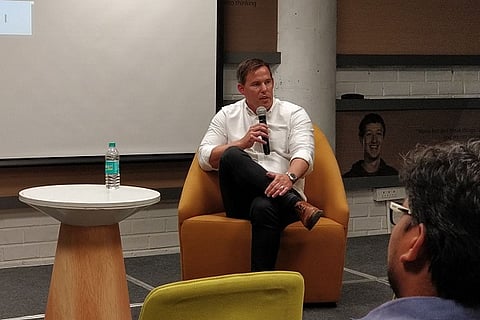

“The startup could have an awesome solution at the best price but if it’s a wrong team, we never invest.”
This is what Sweden-based entrepreneur and angel investor told startups as he visited Hyderabad-based startup incubator T-Hub following the launch of his latest venture, a virtual healthcare platform, DocOnline.
In his 15 years of experience, Markus has built and executed seven companies affiliated to the much-talked about SaaS model, one of which features in the top three innovative companies in Sweden.
In a discussion with various healthcare and tech startups at T-Hub, Markus shared his rich experience as an entrepreneur and investor, and what startups should keep in mind to build a successful venture.
It’s all about the team
From a VC point of view, the team and the people behind the company is the most important thing, according to Markus. “The startup could have an awesome solution at the best price but if it’s the wrong team, we never invest,” he adds. He says that if you have a good team. You can still have a pretty bad product and it still works because then the right team will work well, understand and learn from the investors as well.
“Investors invest in teams. It is very important for investors to see that the team is committed,” Markus says.
B2B is the way to go
Speaking of why Markus’ startup DocOnline took the B2B route, he says that this segment is more effective and is easier to make money in. It is very expensive to run behind customers, and B2C players end up spending a lot of money to do that.
“As a startup, you don’t want to do that. You don’t want to start with a high burn rate. You want to first see that your solution is going well and then start burning money on that,” Markus says.
Customer should come first, literally
Start onboarding customers first. Even if the solution is not perfect, launch it. Customer feedback is very important, he says.
“If you keep developing and developing, competitors will run past you”, Markus says, “It’s never going to be perfect. So launch, get feedback, learn from customers and improve your solution based on that.”
It also ensures that revenue comes in. As Markus says, cashflow is important.
Go to market strategy – know exactly who your customer is
When thinking of your go-to market strategy, it is extremely important to know your persona – who your customer is.
Going for customers is difficult. So, have an exact target audience, say for example, between the ages of 17-25, Marcus says. That way, you will know exactly who to target and won’t go shooting everywhere and wasting money. Once you know that, look at how big the market is, who the competitor is and why should they buy your solution instead of the competitor’s. What are the kind of questions they will come back to you with. Be proactive and answer those questions before they even come to you.
User experience is key
The most important thing that startups must keep in mind, Marcus says, is the user experience they provide. Especially when you do a subscription model and customers have to come back month after month, user experience plays a major role because if it’s bad, users will not come back and money is lost.
“Get customers to use your system and then to keep them on, the experience should be so good that they should want to come back,” Markus says.
Whatever technology is behind it, it’s all about the experience for customers, he adds.
Focus
As a startup, you have to focus. You can’t do 20 things at the same time, says Markus.
“Ensure you do one thing at a time and it is working really well. Then take decisions to go with the next thing. I often see a lot of startups do it wrong. They start with one thing, then they say hey I’m also doing this, and I’m doing this because the customer is asking for it,” he adds.
Do one thing and do it really well. Daily operations must be focus on getting customers and making them happy customers.
This article has been produced with inputs from T-Hub as a part of a partner program.